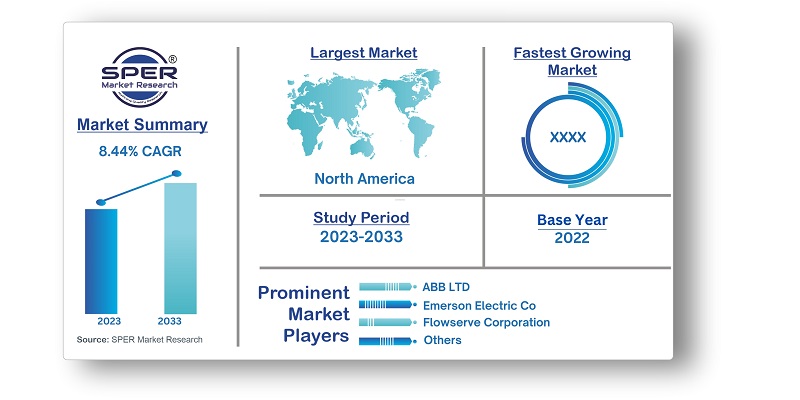
Rotary Actuators Market Growth, Size, Trends, Demand, Revenue, Challenges and Future Outlook
Rotary Actuators Market Size- By Product, By Application- Regional Outlook, Competitive Strategies and Segment Forecast to 2033
| Published: Sep-2023 | Report ID: MACH2349 | Pages: 1 - 234 | Formats*: |
| Category : Equipment and Machinery | |||
- Emerson announced the ASCO Series 158 Gas Valve and Series 159 Motorized Actuator in February 2020. The new solutions, designed exclusively for burner-boiler applications, provide OEMs, distributors, contractors, and end-users with a new combustion safety shut-off valve alternative that improves flow and control while increasing safety and dependability.
- Parker Hannifin Corporation finalized its cash acquisition of LORD Corporation, a prominent manufacturer of sophisticated adhesives and coatings as well as vibration and motion control solutions, in October 2019.


| Report Metric | Details |
| Market size available for years | 2019-2033 |
| Base year considered | 2022 |
| Forecast period | 2023-2033 |
| Segments covered | By Product, By Application |
| Regions covered | North America, Asia-Pacific, Latin America, Middle East & Africa and Europe. |
| Companies Covered | ABB LTD, Emerson Electric Co., Flowserve Corporation, LINAK AS, Rotork plc, SMC Corporation, Curtiss-Wright Corporation, General Electric Co, Moog Inc |
- Manufacturing and Industrial Automation
- Renewable Energy Sector
- Aerospace and Defense
- Healthcare Industry
- Construction and Heavy Machinery
- Automotive Industry
- Maintenance and Repair Services
| By Product: |
|
| By Application: |
|
- Global Rotary Actuators Market Size (FY’2023-FY’2033)
- Overview of Global Rotary Actuators Market
- Segmentation of Global Rotary Actuators Market By Product (Electric Rotary Actuators, Hydraulic Rotary Actuators, Pneumatic Rotary Actuators)
- Segmentation of Global Rotary Actuators Market By Application (Agriculture, Construction, Industrial, Metals & Mining, Oil & Gas)
- Statistical Snap of Global Rotary Actuators Market
- Expansion Analysis of Global Rotary Actuators Market
- Problems and Obstacles in Global Rotary Actuators Market
- Competitive Landscape in the Global Rotary Actuators Market
- Impact of COVID-19 and Demonetization on Global Rotary Actuators Market
- Details on Current Investment in Global Rotary Actuators Market
- Competitive Analysis of Global Rotary Actuators Market
- Prominent Players in the Global Rotary Actuators Market
- SWOT Analysis of Global Rotary Actuators Market
- Global Rotary Actuators Market Future Outlook and Projections (FY’2023-FY’2033)
- Recommendations from Analyst
1.1. Scope of the report1.2. Market segment analysis
2.1. Research data source2.1.1. Secondary Data2.1.2. Primary Data2.1.3. SPER’s internal database2.1.4. Premium insight from KOL’s2.2. Market size estimation2.2.1. Top-down and Bottom-up approach2.3. Data triangulation
4.1. Driver, Restraint, Opportunity and Challenges analysis4.1.1. Drivers4.1.2. Restraints4.1.3. Opportunities4.1.4. Challenges4.2. COVID-19 Impacts of the Global Rotary Actuators Market
5.1. SWOT Analysis
5.1.1. Strengths5.1.2. Weaknesses5.1.3. Opportunities5.1.4. Threats
5.2. PESTEL Analysis
5.2.1. Political Landscape5.2.2. Economic Landscape5.2.3. Social Landscape5.2.4. Technological Landscape5.2.5. Environmental Landscape5.2.6. Legal Landscape
5.3. PORTER’s Five Forces
5.3.1. Bargaining power of suppliers5.3.2. Bargaining power of buyers5.3.3. Threat of Substitute5.3.4. Threat of new entrant5.3.5. Competitive rivalry
5.4. Heat Map Analysis
6.1. Global Rotary Actuators Market Manufacturing Base Distribution, Sales Area, Product Type6.2. Mergers & Acquisitions, Partnerships, Product Launch, and Collaboration in Global Rotary Actuators Market
7.1. Global Rotary Actuators Market Value Share and Forecast, By Product, 2023-20337.2. Electric Rotary Actuators7.3. Hydraulic Rotary Actuators7.4. Pneumatic Rotary Actuators
8.1. Global Rotary Actuators Market Value Share and Forecast, By Application, 2023-20338.2. Agriculture8.3. Construction8.4. Industrial8.5. Metals & Mining8.6. Oil & Gas
9.1. Global Rotary Actuators Market Size and Market Share
10.1. Global Rotary Actuators Market Size and Market Share By Product (2019-2026)10.2. Global Rotary Actuators Market Size and Market Share By Product (2027-2033)
11.1. Global Rotary Actuators Market Size and Market Share By Application (2019-2026)11.2. Global Rotary Actuators Market Size and Market Share By Application (2027-2033)
12.1. Global Rotary Actuators Market Size and Market Share By Region (2019-2026)12.2. Global Rotary Actuators Market Size and Market Share By Region (2027-2033)12.3. Asia-Pacific12.3.1. Australia12.3.2. China12.3.3. India12.3.4. Japan12.3.5. South Korea12.3.6. Rest of Asia-Pacific12.4. Europe12.4.1. France12.4.2. Germany12.4.3. Italy12.4.4. Spain12.4.5. United Kingdom12.4.6. Rest of Europe12.5. Middle East and Africa12.5.1. Kingdom of Saudi Arabia12.5.2. United Arab Emirates12.5.3. Rest of Middle East & Africa12.6. North America12.6.1. Canada12.6.2. Mexico12.6.3. United States12.7. Latin America12.7.1. Argentina12.7.2. Brazil12.7.3. Rest of Latin America
13.1. ABB LTD13.1.1. Company details13.1.2. Financial outlook13.1.3. Product summary13.1.4. Recent developments13.2. Emerson Electric Co13.2.1. Company details13.2.2. Financial outlook13.2.3. Product summary13.2.4. Recent developments13.3. Flowserve Corporation13.3.1. Company details13.3.2. Financial outlook13.3.3. Product summary13.3.4. Recent developments13.4. LINAK AS13.4.1. Company details13.4.2. Financial outlook13.4.3. Product summary13.4.4. Recent developments13.5. Rotork plc13.5.1. Company details13.5.2. Financial outlook13.5.3. Product summary13.5.4. Recent developments13.6. SMC Corporation13.6.1. Company details13.6.2. Financial outlook13.6.3. Product summary13.6.4. Recent development13.7. Curtiss-Wright Corporation13.7.1. Company details13.7.2. Financial outlook13.7.3. Product summary13.7.4. Recent development13.8. General Electric Co13.8.1. Company details13.8.2. Financial outlook13.8.3. Product summary13.8.4. Recent development13.9. Moog Inc13.9.1. Company details13.9.2. Financial outlook13.9.3. Product summary13.9.4. Recent development13.10. Others
SPER Market Research’s methodology uses great emphasis on primary research to ensure that the market intelligence insights are up to date, reliable and accurate. Primary interviews are done with players involved in each phase of a supply chain to analyze the market forecasting. The secondary research method is used to help you fully understand how the future markets and the spending patterns look likes.
The report is based on in-depth qualitative and quantitative analysis of the Product Market. The quantitative analysis involves the application of various projection and sampling techniques. The qualitative analysis involves primary interviews, surveys, and vendor briefings. The data gathered as a result of these processes are validated through experts opinion. Our research methodology entails an ideal mixture of primary and secondary initiatives.



Frequently Asked Questions About This Report
PLACE AN ORDER
Year End Discount
Sample Report
Pre-Purchase Inquiry
NEED CUSTOMIZATION?
Request CustomizationCALL OR EMAIL US
100% Secure Payment






Related Reports
Our Global Clients
Our data-driven insights have influenced the strategy of 200+ reputed companies across the globe.




















